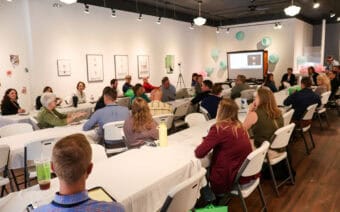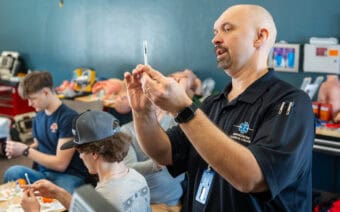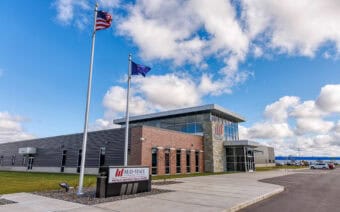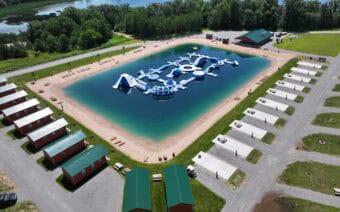
March 4, 2024
ANTIGO – “I wouldn’t have wanted to work here if it were the ‘Wood Technology Center of Mediocrity,’” Logan Wells, the program director and a faculty member of Northcentral Technical College’s (NTC) wood science program, said.
The program is based out of NTC’s regional campus in Antigo, at what Wells said is the aptly named Wood Technology Center of Excellence.
“We live up to that name, or strive to, every day when we come to work here – both students and faculty,” he said.
Per NTC’s website (ntc.edu), the facility has 27,000 square feet devoted to its wood science program, which encompasses a two-year associate’s degree, a one-year technical diploma, specialized certificates and numerous continuing education classes and industry training courses.
“What does ‘wood science’ mean?” Wells said. “A lot of people think of their high school wood shop and sanding and cutting boards or making something – but we focus on the entire supply chain from the minute that tree is cut down to making and mass-producing finished products. It’s a cool program, and it goes a lot further than just building that birdhouse.”
From forestry to industry
Wells said he’s now in his third year as a wood science instructor at NTC and oversees all aspects of the coursework.
He said he was interested in woodworking and forestry from a young age – even starting a portable sawmill business in his teens that helped pay for his forest science degree at the University of Wisconsin-Madison.
From his subsequent master’s degree in forestry from Purdue to managing a hardwood sawmill, to working as a forest products specialist for the Wisconsin Department of Natural Resources, Wells said his fascination with wood properties continually grew deeper.
“Why do we use white oak for bourbon and whisky barrels, wine barrels?” he said. “And why do we use hickory for axe handles, but not shovel handles? It’s a wood properties thing.”
Wells said he was able to learn and appreciate the entire lifecycle of wood products from forest management, harvesting lumber, grading and drying boards, building products and even marketing.
He said his connections throughout his educational and career experiences led to his current position at NTC, which he said allows him to teach about all facets of the industry.
“The diversity of our program is truly spectacular,” he said. “It’s not just one area of the industry people are going into.”
NTC’s wood science program, Wells said, is unique in the way it starts with raw material in a sawmill and follows through to finished wood products.
“There are not many other wood manufacturing programs like ours that cover that entire supply chain,” he said. “In fact, we’re the only two-year associate’s degree program in the country that teaches these subjects.”
Wells said the variety and depth of the different wood science credentials offer ideal options for students whether or not they’ve decided on a specific area to pursue.
The breadth of the associate’s degree program, he said, makes it a perfect fit for some students, citing one in particular.
Wells said the student didn’t know exactly what she wanted to do but liked this program because there were so many different career path options in this field.
“So, if she wants to be on the primary side, turning logs into lumber or raw material products, she can do that,” he said. “If she wants to be in more of a sales, customer support role, she can go that route or marketing, or if she wants to make finished products and look at running a CNC router.”
Because of this broad range, Wells said, the programs utilize creativity, people skills, business strategy, science and math.
He said the common interest shared by virtually all wood science students, though, is the love of working with their hands.
For learners who have honed in on a more specialized topic, Wells said, certificates may be a more appropriate choice.
“Think of (certificates) as a concentration with two to four classes that focus on one area of the industry a student wants to learn and explore for a career path,” he said. “Those can range from as little as four weeks to as long as a semester.”
Some of these curricula, Wells said, include moulder set-up and knife grinding, log and lumber grading and scaling, fundamental and advanced furniture building and industrial wood manufacturing, where he said students make “not just one nightstand, but semi-truck loads of nightstands.”
Wells said this coursework is developed with an advisory board consisting of local businesses knowledgeable of the skills, machines and software most relevant to current operations and job openings.
One example of corroborating the board’s recommendations, he said, is the way NTC’s course on kiln drying – removing water from recently cut lumber – has routinely been cited as “by far the best in the country” by industry professionals.
He said saw filing – sharpening, maintaining and repairing industrial wood saws – was another niche area of focus the board suggested.
“(Representatives of the) industry came to our program and NTC and said ‘saw filers are retiring, we don’t have enough young people coming into this and we’ve got to train (workers) before we lose this knowledge base,’” he said.
As a result, Wells said the college began offering training on band saw filing – a four-week course that draws enrollment from students all over the country.
The success of that training, Wells said, led to NTC renovating more than 1,500 more square feet of lab space for the Wood Technology Center of Excellence to offer circular saw filing.
He said this training is set to commence this fall.
An even larger in-progress expansion, Wells said, is a new, approximately 10,000-square-foot training sawmill.
He said the mill is being built in partnership with the University of Wisconsin-Stevens Point and is set to open in 2025.
“We haven’t had the equipment to demonstrate industrial lumber manufacturing, and with this partnership, we’re able to build a state-of-the-art training mill,” he said, “Which is going to be phenomenal for our industry – not just for Wisconsin but across the country.”
Going with the grain
Though the wood science program aims to accommodate industry training needs nationwide and beyond, Wells said, the curricula offered at NTC is above all crafted with the local community in mind.
He said the college understands when residents of the region pursue wood-related employment rather than a degree, and NTC “wants to support them in that career path” regardless.
“Anybody who wants jobs in this industry is going to have multiple job offers,” he said. “We want to be here where they can up-skill and get that professional development training when they need it.”
Kelsi Seubert, manager of marketing and public relations at NTC, said students who choose the two- or one-year wood science credentials benefit from the programs’ relatively small cohorts.
“If you think about the students who are interested in continuing their education or beginning a full-time program, they are going to get passionate one-on-one support they’re not going to get elsewhere,” Seubert said.
Wells said other ways NTC has leveraged the Wood Technology Center of Excellence to serve the community include offering flexible class schedules and hosting career and college events for area adults and high school students.
He also said the coursework has been particularly well received by military veterans.
Another way the program gives back, Wells said, is by donating the wood products created by students, such as flooring and cabinet doors, to local schools and charities.
Perhaps the most popular way NTC benefits the community, Wells said, is the variety of non-credit courses offered for community members.
For those looking to acquire or brush up on woodworking skills, he said, classes like spoon carving, bowl turning and furniture making are in high demand.
Beyond the boost his curricula provides the Antigo area, Wells said he relishes the opportunity to share his wisdom and lifelong passion for trees.
“Trees are beautiful, and using trees provides this incentive to keep growing trees,” he said. “In Wisconsin, we grow more trees than we harvest by far – it’s like two to one – so the beauty of this industry is it’s allowing us to sustainably manage forests, as well as provide beautiful wildlife habitat, clean oxygen and drinking water. When you can tie in the beauty of the way the natural resource grows, and then all the beautiful things we can make with it here, we have the best manufacturing in the world, as far as I’m concerned, with our technologies, innovation and environmental friendliness. This program focuses on all those beautiful things.”
Learn more about Northcentral Technical College’s wood science programs, classes and events at NTC.edu.
 Turtle Stack Brewery brews a decade of business in La Crosse
Turtle Stack Brewery brews a decade of business in La Crosse 10-4, good buddy: Schneider is celebrating 90 years
10-4, good buddy: Schneider is celebrating 90 years








